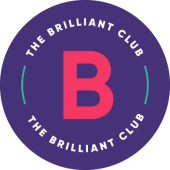Sowing the Seeds of Society
Written by: Jessica Fostvedt Austin

After a tedious number of years processing endless samples at the lab bench, I decided that my talents were best served in scientific writing, teaching, and outreach. This was not a sudden career crisis; I entered this PhD programme knowing I would rather author a textbook than work in a laboratory. If that sounds like a hyperbole it is not, I am just a strange kind of scientist.
When offered the opportunity to teach underprivileged pupils a university level course, I thought it would be a great fit for my research placement. The Brilliant Club is a UK charity working to encourage students of under-represented backgrounds to pursue higher education. They recognized that on average, only one out of fifty students from disadvantaged schools enter highly selective universities compared to one in four from more privileged backgrounds. To address this gap, they aim to introduce young people to PhD level study by placing a doctoral candidate in the classroom to give a short, simplified lecture series abou
t the subject of their research. The PhD student writes a handbook with a weekly lesson plan, culminating in a final essay or test. The organization hopes that this tiny introduction will empower students to believe in their ability to perform university level work.
It is no secret that class division prevents some of the country’s most vulnerable citizens from accessing higher education, but the reasons are complex. Although there are no more legal barriers preventing individuals of certain socio-economic or demographic backgrounds from applying, the cycle of poverty is difficult to escape. When no positive role models exist in these children’s lives, the possibilities for their future may not be apparent to them. Brilliant Club tutors were employed as ambassadors of the university system, available to answer questions about university life, expectations, study habits, and more as they deliver their specialized course.
 My lessons focused on plant identification and conservation ethics. In a time when our planet’s future remains uncertain, many plant conservation programs are losing funding. Reading University recently ended its Plant Diversity course after deeming it financially infeasible. It appears the most lucrative professions are the things which destroy the planet fastest. In delivering my course, I hope to instill the love of plants, as well as a taste for university level work, in my students. They came away with a better appreciation for the diversity of plant life and the complexity of sustainable ecosystem management.
My lessons focused on plant identification and conservation ethics. In a time when our planet’s future remains uncertain, many plant conservation programs are losing funding. Reading University recently ended its Plant Diversity course after deeming it financially infeasible. It appears the most lucrative professions are the things which destroy the planet fastest. In delivering my course, I hope to instill the love of plants, as well as a taste for university level work, in my students. They came away with a better appreciation for the diversity of plant life and the complexity of sustainable ecosystem management.
To approach such a broad topic, I decided to focus on only five plant families and a single, focused ethical dilemma. The students were tested on their ability to use a botanical identification key specializing in conifers. Cone-bearing trees and shrubs are an excellent teaching tool for beginners in botanical identification, because they have large, easily distinguishable features. It also helped that all the plant material was available year-round in the University of Reading’s botanical garden. Using hands on samples, I introduced the class to examples of fir, pine, spruce, and cypress species.
In addition to the PhD ambassadors, the Brilliant Club does everything it can to enhance the abilities of every participating student and break any barriers left in accessing a better future. I took part in a project by the organization to produce explanatory videos to aid student research projects. These were assembled by PhD students and distributed to the students to watch as they needed. We have come a long way, but there is room to improve. By continuously breaking barriers, we can bridge the gap in education access between the rich and the poor, inspire young people to pursue a wide variety of disciplines, and sow the seeds of our future.


